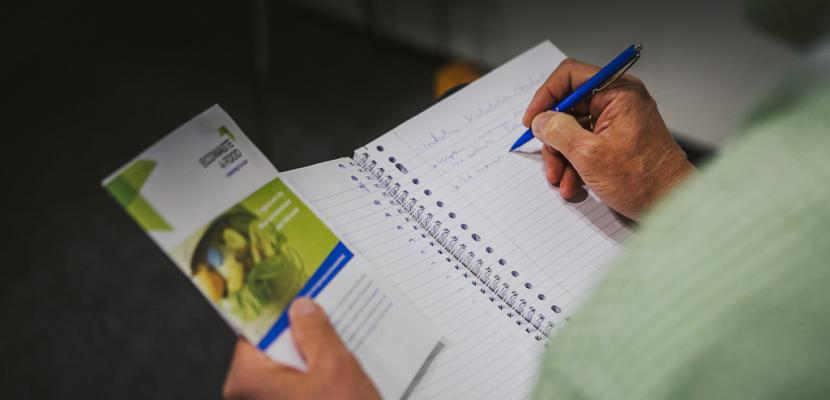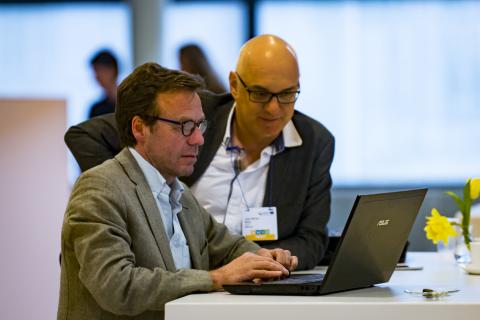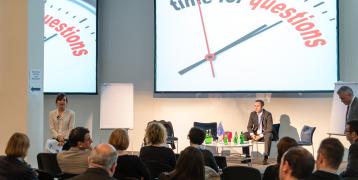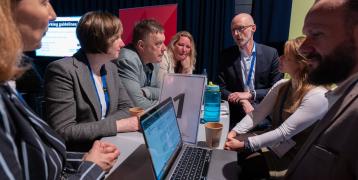
Project application
Welcome to our help and guidance page on how to get funding for an Interreg Europe project. Scroll through the categories below to find answers to your questions about what we fund and how to apply.
Watch our video on the projects we fund
Programme topics
Our projects cover a wide variety of topics and issues:
We are a thematic programme. Our projects must have a clear focus on one of the six themes we tackle.
But as long as the thematic focus is clearly defined within one of our priorities, topics with a cross-cutting character are welcome.
Policy instruments
A policy instrument is a means of public intervention. It refers to any policy, strategy, or law developed by public authorities and applied on the ground in order to improve a specific territorial situation. In most cases, a policy instrument is supported by financial resources. However, an instrument can also sometimes refer to a strategy or legislative framework with no specific funding. In the context of Interreg Europe, operational programmes under the Investment for jobs and growth goal are considered policy instruments. Beyond the programme of the EU cohesion policy, local, regional or national public authorities develop their own policy instruments, which can also be addressed by Interreg Europe projects.
Policy instruments are related to a specific territory. Partners from different regions or countries will work on their own policy instrument. Therefore, there are as many policy instruments as territories considered in the project.
For example, if a project involves the Murcia regional government from Spain and the Baden-Württemberg government from Germany, they will each work on a different regional programme (the ERDF Regional Operational Programme of Murcia and the ERDF Regional Operational Programme of Baden-Württemberg), each of them counted as one policy instrument.
We recommend that each partner addresses only one policy instrument.
However, it is possible that two partners address the same policy instrument. For instance, the managing authority of a regional operational programme and a regional agency can both be involved in a project to improve the regional operational programme. In this case, the two partners will be listed as partners relevant for the same policy instrument in the application form.
At least one policy instrument addressed in the application has to be an Investment for jobs and growth goal programme. And it must be the operational programme itself.
For instance, the Sustainability Urban Mobility Plan (SUMP) of a specific city cannot be considered an operational programme even if this SUMP is fully financed through Structural Funds. To be deemed to be Structural Funds, the applicant has to describe the corresponding investment priority of the operational programme and not the SUMP in section B.2 of the application form.
Partnership
The following bodies are eligible to receive ERDF or Norwegian funding and can therefore be ‘partners’ in Interreg Europe projects:
- Public authorities
- Public law bodies (bodies governed by public law)
- Private non-profit bodies
Projects have to involve partners from at least three countries, from which at least two partners must be from the EU member states, financed by the Interreg Europe programme.
There are different ways to be involved in projects.
|
Participation type |
What do they do? |
|
Lead partner |
In each project, one of the partners is appointed to act as lead partner. The lead partner is the formal link between the project and the managing authority/joint secretariat (in accordance with Article 26 of Regulation (EU) No 2021/1059). The lead partner takes on the responsibility for management, communication, implementation and coordination of activities undertaken by project partners. |
|
Partners |
This is the most straightforward and direct way for an organisation to be involved in a project. Only organisations which financially contribute to and are committed to the project (i.e., organisations with a dedicated budget) are considered a partners. This also means that only formal partners can receive ERDF/Norwegian funding from the programme. |
|
Advisory partners |
As any other ‘regular’ partner, they are included in the ‘Partnership’ section of the application form and can receive financing from Interreg Europe. Advisory partners do not address any policy instrument. They participate in the project to offer a particular competence that can facilitate the project’s implementation. This may be the case of an academic institution that is specialised in the topic tackled by the project or in the exchange of experience process. |
|
Associated policy authority |
The participation of the authorities responsible for the policy instruments addressed in a project is mandatory. When the participation of the responsible authority as partner is not possible and therefore another organisation from the region becomes involved as partner, this responsible authority must still be involved as an ‘associated policy authority’’. |
|
Stakeholders |
Other organisations relevant for the policy issue addressed. A stakeholder group must be created for each policy instrument addressed in a project. The stakeholder group does not have a budget. However, its members travel and accommodation costs are eligible as long as they are paid by the partners that are directly funded by the programme. |
Policy responsible authorities are national, regional, local public authorities and other relevant bodies responsible for developing and/or delivering regional development policies.
Our experience from the previous programming periods have confirmed that the direct involvement of these authorities helps to ensure that projects achieve their objectives.
Therefore, the involvement of the policy responsible authority as partner is compulsory for at least 50% of the policy instruments addressed in a project application. For the remaining policy instrument(s), this authority must be involved as an ‘associated policy authority’.
Interreg Europe is the only Interreg programme that covers the whole of Europe. We encourage projects partnerships to include a mix of regions with different levels of development, and to go beyond the cross-border and transnational cooperation areas. Wider geographical coverage allows partners to broaden their pool of experience and compare their practices with practices in different cultures and contexts.
Activities
The main activities we fund relate to:
- Exchange of experience
- Pilot actions (if relevant)
The exchange of experience among partners (also called ‘interregional learning process’) is the main catalyst for generating the expected policy improvement in the participating regions. The typical activities related to this learning process are activities such as:
- seminars
- workshops
- site visits
- staff exchanges
- peer reviews
The learning process is based on the identification, analysis and exchange of knowledge and practices from the participating regions in the policy field tackled by the project.
You can ask for a pilot action at two moments during your project's implementation:
- At the start of the project within the application form
- During the mid-term review organised in the core phase
The implementation of pilot actions should be fully part of the interregional learning process contributing to achieving the project objectives. For this purpose, the pilot actions should be developed and implemented jointly by the partnership.
Project budget
There is no one-size-fits-all solution. The right approach to estimating a reasonable project budget is to first plan the activities to be carried out and then plan the budget on the basis of those activities. Therefore, the overall budget has to be in line with the activities planned, the project’s duration and the number of partners involved. This implies that the detailed budget is always prepared on the basis of the activities needed to meet the project’s objectives and the resources required to carry out these activities within the time allowed.
Based on our past experience, the total ERDF budget of a project usually goes from 1 MEUR up to 2 MEUR.
We cover the following items:
|
Cost category |
Recommendations/ rules |
|
Staff |
Usually, the largest share of the total budget It applies to the staff employed by the project partners |
|
Office and administrative |
Flat rate of 15% of the staff costs It is automatically calculated in the application form |
|
Travel and accommodation |
Choice to be made in the application form between:
|
|
External expertise and services |
Less than 50% of the total budget (recommended) It applies to services and expertise provided by an organisation other than the project partners (including travel costs for staff of the associated policy authorities and stakeholders). |
|
Equipment |
Office equipment (usually not exceeding EUR 7,000 per project) and other equipment (in case of pilot actions) |
|
Infrastructure and works |
Only relevant for pilot actions, if needed |
The project activities are co-financed by the ERDF at either 70% or 80% depending on the legal status of the project partner.
Partners from Norway are not eligible to receive funding from the ERDF but may receive co-financing of up to 50% from pre-allocated national funds.
|
Co-financing rate |
Eligible project partner |
|
80% ERDF |
Public bodies and bodies governed by public law |
|
70% ERDF |
Private non-profit bodies |
|
Up to 50% Norwegian funding |
Public bodies, bodies governed by public law and private non-profit bodies from Norway |
|
Swiss funding |
Partners from Switzerland are invited to contact the Swiss Interreg national point of contact to receive information on Swiss funding opportunities |
More answers
Programme documents
Download the programme's key documents.
Programme manual.pdf
2021-2027 Interreg Europe programme manual and its annexes. Version 4, December 2024. Click Ctrl + F5 if you still see version 3.

Develop your project
Use our tools to put together your project idea, make it relevant for our programme and prepare your project application.
Latest tutorials
Find the latest webinars and tutorials on project application to help you prepare for the open call.


Upcoming events
Discover our upcoming events on project funding.

Designing project methodology webinar
Join us on 25 April for a project development webinar about designing the project methodology . It is the second one in a set of four webinars on how to develop your project and submit it in an application during this call. The timing of the webinar series is the following: Building a successful
Management and finances webinar
Join us on 26 April for a project development webinar about the project management, budget and finances . It is the last one in a set of four webinars on how to develop your project and submit it in an application during this call. The timing of the webinar series is the following: Building a

